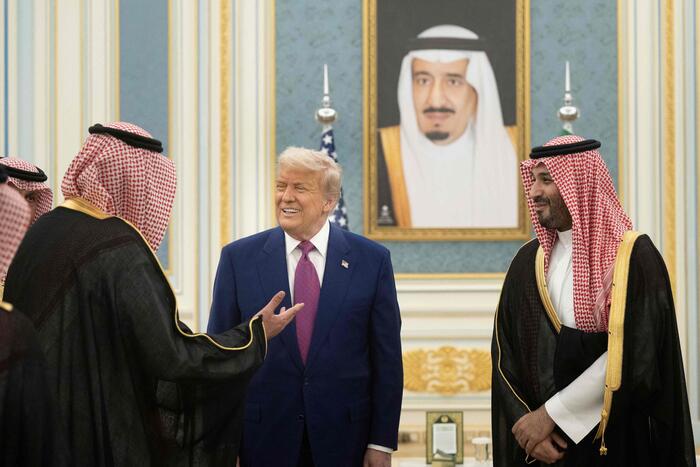U.S. President Donald Trump met with Syrian leader Ahmed al-Sharaa on Wednesday during a Gulf summit in Riyadh, as the White House announced plans to lift all U.S. sanctions on Damascus following years of isolation.
The talks, held in the presence of Saudi Crown Prince Mohammed bin Salman, come amid renewed U.S. efforts to reshape regional dynamics. According to the White House press secretary, Trump urged Sharaa to pursue normalization with Israel, citing the 2020 Abraham Accords signed by the United Arab Emirates, Bahrain, and Morocco.
“I think they will join at some point,” Trump told reporters, according to a Washington Post pool report. “I told him, ‘I hope you’re going to join when it’s straightened out.’ He said, ‘Yes.’ But they have a lot of work to do.”
Footage aired on Saudi state television showed Trump and Sharaa shaking hands with bin Salman between them. Turkish President Recep Tayyip Erdogan also joined the meeting via videoconference. The session lasted 33 minutes. “He’s a young, attractive guy with a very strong past,” Trump said. “He’s got a real shot at holding it together.”
Sharaa, formerly known by his nom de guerre Abu Mohammed al-Golani, once led the jihadist group Hayat Tahrir al-Sham and was a senior figure in al-Qaeda’s Syrian affiliate, Jabhat al-Nusra. He spent five years in a U.S. prison in Iraq and was previously subject to a $10 million U.S. bounty. In 2016, however, he formally cut ties with al-Qaeda. He assumed power in Damascus in January following the collapse of Bashar al-Assad’s regime, ousted by a coalition of rebel forces led by Sharaa and supported by Turkey and Qatar.
The State Department said lifting the restrictions, originally imposed under Assad and maintained during the transition, would help facilitate foreign investment, humanitarian aid, and Syria’s reintegration into the global financial system.
“There are many opportunities for investment in Syria, and Saudi Arabia is ready to support the country’s economic recovery,” Saudi Foreign Minister Prince Faisal bin Farhan Al Saud told reporters during a joint press event.
The move has drawn sharp reactions in Israel. Officials close to Prime Minister Benjamin Netanyahu reportedly expressed deep concern, noting Sharaa’s extremist past despite his break with al-Qaeda. The prime minister’s office declined to comment, but Israeli officials reiterated their opposition to any Islamist presence in southern Syria. Since Assad’s ouster, Israel has intensified airstrikes in Syrian territory, citing national security concerns.
According to the Syrian foreign ministry, the meeting also covered counterterrorism cooperation and plans to dismantle armed militias, including remnants of the Islamic State. A follow-up meeting between Syrian and U.S. foreign ministers, including Secretary of State Marco Rubio, is expected in the coming days.
Following the Riyadh visit, Trump traveled to Qatar, where he was received by Emir Tamim bin Hamad Al Thani. Qatari fighter jets escorted Air Force One as it approached Doha, where Trump was honored with a full ceremonial welcome including Arabian horses and camel processions.
During their bilateral talks, Trump praised the “impeccable” reception and expressed admiration for the royal palace’s design. Al Thani, in turn, expressed hope for U.S. efforts in Gaza. “I know that you are a man of peace,” the emir told Trump. “I know that you want to bring peace to this region.”
The Gulf trip has also included major economic announcements. Saudi Arabia has pledged $600 billion in investments in the U.S., along with $142 billion in arms deals. Qatar is expected to unveil additional investment agreements soon. Trump is the first U.S. president to visit Qatar in over two decades.
Meanwhile, Iran remained a central topic at the GCC summit. Trump reiterated that a nuclear deal with Tehran is still possible, but warned that time is running out.
“Iran must stop sponsoring terror, halt its bloody proxy wars and permanently and verifiably cease pursuit of nuclear weapons,” Trump said.
The U.S. and Iran have held four rounds of talks in recent weeks. Speaking later aboard Air Force One, Trump said Tehran “has to make the right decision because something’s going to happen one way or the other. And that won’t be pleasant.”
Iran’s Foreign Minister Abbas Araghchi dismissed Trump’s comments as “deceitful,” but offered no direct response to the demand that Tehran cut support to proxy groups such as Hamas, Hezbollah, and the Houthis.
“This is a moment ripe for a future free from the grip of Hezbollah terrorists,” Trump added, claiming that the group had been severely weakened in recent months following its war with Israel and the fall of the Assad regime, which served as a conduit for Iranian weapons.
Trump’s regional tour is expected to continue in the United Arab Emirates later this week.












